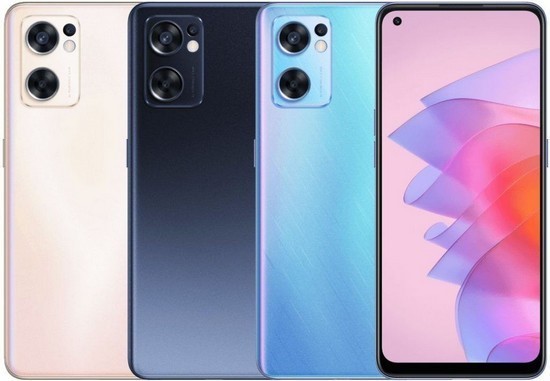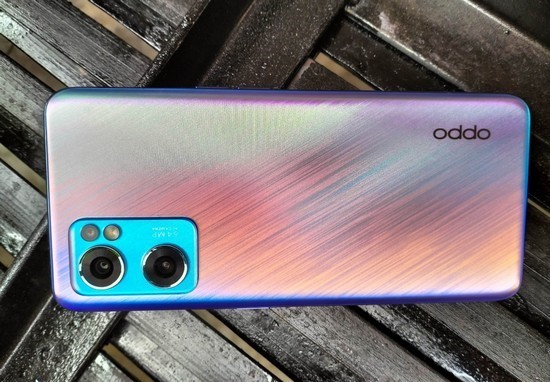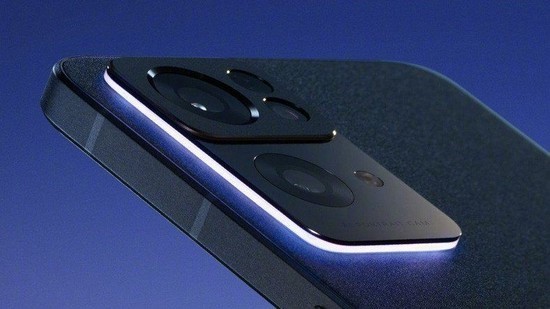The
Oppo Reno 7 is the Reno 7 Pro’s younger sibling, but unlike the Reno 7
Pro, the Reno 7’s upgrades have mostly concentrated on design. While it does
get a few handy upgrades, like expandable storage and a slightly bigger
battery, the features and specifications remain mostly the same as the Oppo
Reno 6 — but it is cheaper.
اضافة اعلان
In this article,
we will evaluate the Reno 7 and its features to help you gauge whether or not
this is the phone for you.
Design
The Oppo Reno 7’s fresh appearance is appealing. This phone has a sleek
appearance because of its rounded frame and curved edges on the rear.
The Reno 7
receives the same laser-etched design on the back as the Reno 7 Pro. It also does not attract fingerprints. The phone also very thin
and light, weighing only 173g.
All of this makes
the phone quite easy to handle and operate, but Oppo had to make some
sacrifices. The Reno 7’s glossy frame and back panel are made of plastic rather
than metal and glass like the Reno 7 Pro. Even the Reno 6 had an aluminum
frame, which is a slight drop in quality.

The Oppo Reno 7 has a headphone jack and the 6.4-inch AMOLED display is the same as
the previous generation, it offers a Full-HD+ resolution, a maximum refresh
rate of 90Hz, and is protected by Corning Gorilla Glass 5.
Except for the
chin, the bezels around the display are rather thin. In addition, an in-display
fingerprint sensor and facial recognition through the selfie camera in the
hole-punch cutout are included.
Overall, while the
phone appears to be stylish at a distance, when up close and personal, it falls
short and feels slightly cheaper than it actually is.
Specifications and software
Oppo has not bothered to
update the Reno 7’s SoC — which is essentially the “brain” of the phone — and
kept the same MediaTek Dimensity 900 seen in the Reno 6. This is still a pretty
modern and strong 5G SoC built on a power-efficient 6-nanometer fabrication
process, but having something newer like the Dimensity 920 would have made this
phone more competitive, particularly against versions based on Qualcomm’s
products like the Snapdragon 778G.
The phone lacks stereo speakers, which is
unfortunate given how widespread this feature has become. So, the Reno 7 might
fall short on the audio quality side of things for those who enjoy their media
without auxiliaries.
The Reno 7 software experience is identical to that
of the Reno 7 Pro. It runs ColorOS 12 on Android 11 and will almost certainly
get a reliable Android 12 upgrade soon.

Users get a slew of new shortcuts and gestures, a
theme shop to personalize the look of your phone, and many other customizations
for the always-on display, including new
Apple-like Omoji avatars.
Bloatware is plentiful in the form of third-party
apps, which tend to fill your notification shade with spammy notifications.
Fortunately, all of them can be removed.
Battery life and performance
Day-to-day performance was relatively consistent. The SoC is capable of
handling frequently used productivity and social apps. The UI also operates
nicely at 90Hz, with no obvious sluggishness or animation slowdowns. The
phone’s lightweight and small design makes it easy to carry in your pocket, and
one-handed use is now easier than ever.
The Reno 7 also
performed admirably with videos and games. The audio quality was adequate,
although the experience may have been enhanced by using dual speakers. Heavy
titles, such as
PUBG: New State, performed admirably with the graphics level
turned up to 11. The gameplay was fluid, and the Reno 7 never became
excessively hot, even after extended sessions.
The increase in
battery capacity to 4,500mAh (from 4,300mAh in its predecessor) appears to have
substantially influenced battery life. In HD video loop tests, the Reno 7
lasted 19 hours and 25 minutes, three hours longer than the
Reno 6.
With average use,
users can easily get two full days out of it. Charging was speedy, and the
included charger allows users to completely charge the phone in under an hour,
thanks to the renewed battery technology.
Cameras
The Reno 7’s cameras have also not changed much. Still, the AI
functions in the camera app have been improved, so you can now digitally adjust
the aperture for a narrower depth of field while filming movies — exactly like
the Reno 7 Pro.
However, these
are minor adjustments, and everything else on the Reno 6 remains the same. The
phone can shoot up to 4K 30fps, but video stabilization is still restricted to
1080p. When you enable any of the filters or AI capabilities when recording
video, the resolution is set to 1080p by default.
Camera sensors
are also somewhat similar. The Reno 7 is equipped with a 64-megapixel primary
camera with an f/1.7 aperture, an 8-megapixel ultra-wide camera, and a
2-megapixel macro camera. In the front, there’s a 32-megapixel camera for
selfies.
 The final take
The final take
Given that the Reno 6 was released less than a year ago, it’s
understandable why Oppo has not given the Reno 7 a substantial overhaul.
However, unless
the business promises to replace this phone with a Reno 8 this year, the Reno 7
may struggle to acquire a foothold in the market, especially because
alternatives exist within the same price range from Huawei, Xiaomi, and even
Samsung that have more capable hardware.
Overall system
and game performance are decent, battery life is adequate, and the phone is
light and comfortable to use. When it comes to stills, the cameras are not too
awful, and the possibility to extend the internal storage is a wonderful
feature of this model. The Reno 7, like the Reno 6, can be a trustworthy
everyday driver.
However, some of
the phone’s drawbacks include a lack of stereo speakers, poor video recording
capabilities, and a lower-quality plastic casing than the Reno 6.
Our advice? It’s a good
phone with no obvious flaws, but be aware that more feature-rich alternatives
are available, and these alternatives offer a lot more bang for your buck.
Read more Technology
Jordan News








